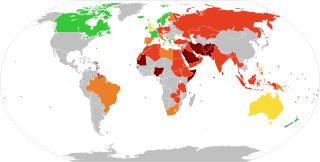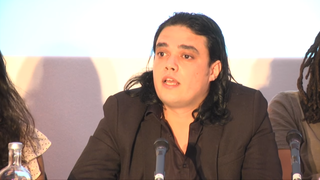Related Research Articles
Censorship in Tunisia has been an issue since the country gained independence in 1956. Though considered relatively mild under President Habib Bourguiba (1957–1987), censorship and other forms of repression became common under his successor, President Zine El Abidine Ben Ali. Ben Ali was listed as one of the "10 Worst Enemies of the Press" by the Committee to Protect Journalists starting in 1998. Reporters Without Borders named Ben Ali as a leading "Predator of Press Freedom". However, the Tunisia Monitoring Group reports that the situation with respect to censorship has improved dramatically since the overthrow of Ben Ali in early 2011.

The Pakistan Penal Code, the main criminal code of Pakistan, penalizes blasphemy against any recognized religion, providing penalties ranging from a fine to death. According to the US Commission on International Religious Freedom, around 80 people are known to be incarcerated in Pakistan on blasphemy charges — half of those face life in prison or the death penalty. From 1967 to 2014, over 1,300 people were accused of blasphemy, with Muslims constituting most of those accused. According to human rights groups, blasphemy laws in Pakistan have been exploited not only for persecuting minorities but also for settling personal rivalries, often against other Muslims. Though no judicial execution has been carried out under these laws, many of those accused, their lawyers and any persons speaking against blasphemy laws and proceedings have become victims of lynchings or street vigilantism in Pakistan. More than 75 people were murdered for blasphemy between 1987 and 2017.

Blasphemy in Islam is impious utterance or action concerning God, but is broader than in normal English usage, including not only the mocking or vilifying of attributes of Islam but denying any of the fundamental beliefs of the religion. Examples include denying that the Quran was divinely revealed, the prophethood of one of the Islamic prophets, insulting an angel, or maintaining God had a son.

A blasphemy law is a law prohibiting blasphemy, which is the act of insulting or showing contempt or lack of reverence to a deity, or sacred objects, or toward something considered sacred or inviolable. According to Pew Research Center, about a quarter of the world's countries and territories (26%) had anti-blasphemy laws or policies as of 2014.
Blasphemy law in Indonesia is the legislation, presidential decrees, and ministerial directives that prohibit blasphemy in Indonesia.
The main blasphemy law in Egypt is Article 98(f) of the Egyptian Penal Code. It penalizes: "whoever exploits and uses the religion in advocating and propagating by talk or in writing, or by any other method, extremist thoughts with the aim of instigating sedition and division or disdaining and contempting any of the heavenly religions or the sects belonging thereto, or prejudicing national unity or social peace."
The People's Democratic Republic of Algeria prohibits blasphemy against Islam by using legislation rather than by using Sharia. The penalty for blasphemy may be years of imprisonment as well as a fine. Every Algerian child has an opportunity to learn what blasphemy is because Islam is a compulsory subject in public schools, which are regulated jointly by the Ministry of Education and the Ministry of Religious Affairs.

Waleed Al-Husseini or Walid Husayin is a Palestinian atheist, secularist essayist, writer, blogger, ex-Muslim and founder of the Council of Ex-Muslims of France. Born and raised in Qalqilya in the West Bank, he has been living in France since 2012.
Hamad al-Naqi is a Kuwaiti activist and blogger who in June 2012 was sentenced to ten years' imprisonment for charges pertaining to provoking sectarian tensions and blasphemous tweets against the prophet Mohammed. His arrest triggered international outcry from human rights organizations and world leaders.
Alexander Aan is an Indonesian atheist and ex-Muslim of Minang descent. He was imprisoned in 2012 for posting comments and images to Facebook that were judged to be "disseminating information aimed at inciting religious hatred or hostility" by the Muaro Sijunjung district court. The sentence sparked national debate and caused Amnesty International to designate him a prisoner of conscience.

Kacem El Ghazzali, is a Moroccan-Swiss secularist essayist and activist and is one of the few Moroccans to publicly announce to be an atheist. Kacem speaks English, as well as German, French, Arabic and Berber. Mostly known for his publicly voiced atheism, his writings stress the importance of freedom of thought which, in his view is lacking in countries dominated by Islam. His articles have been published in/by the Richard Dawkins Foundation, Huffington Post, Le Monde, Neue Zürcher Zeitung, Frankfurter Allgemeine Zeitung, Basler Zeitung and others.

Alber Saber Ayad is an Egyptian computer science student and blogger who was arrested on 13 September 2012 on allegations of having shared the YouTube trailer for the anti-Islam film Innocence of Muslims on his Facebook page. While he was raised in a Coptic Christian family, he is now an atheist.
Irreligion in Morocco is relatively uncommon, in the country. While a 2015 poll of about 1000 Moroccans by Gallup International found that 4% of respondents said they were "not religious", and 1% reported being a "convinced atheist", while 93% said they were religious; Another survey of about 2,400 Moroccans in 2019 by Arab Barometer found that 13% answered that they are "not religious", 44% said they are "somewhat religious", and 38% "religious". Younger people were less likely to consider themselves "religious", with only 24% of those aged 18–29 years identifying themselves as such.

Soheil Arabi, is an Iranian blogger who was sentenced to death in Iran in 2013 on charges of insulting the Prophet Mohammad in his postings on Facebook about Atena Daemi. His sentence was commuted in 2015 to several years imprisonment and two years of mandatory study of Islamic theology.

Asif Mohiuddin is a Bangladeshi atheist and secular activist, religious critic and feminist. In 2012, he won The Bobs-Best of Online Activism award from Deutsche Welle, who stated that "Asif's blog was one of the most read web pages in Bangladesh and is known for its strong criticism of Islamic fundamentalism in Bangladesh's "anti-people politics", his blog was later blocked and banned in Bangladesh by its government. On 15 January 2013, he survived an assassination attempt by Islamic extremists. A few months later, he was imprisoned twice by the Bangladesh Government for posting "offensive comments about Islam and Mohammad". Due to sustained international pressure, Mohiuddin was released, after which he fled from his country to Germany in 2014. In 2015, he received the Anna Politkovskaya Award for Journalism.
Sherif Gaber Abdelazim Bakr, is an Egyptian political activist and blogger who was arrested on October 27, 2013, for professing atheism, contempt of religion relating to activities on campus and atheist statements online.

Mohamed Cheikh Ould Mkhaitir is a Mauritanian blogger who was a political prisoner from 2014 to 2019. He was sentenced to death after he wrote an article critical of Islam and the caste system in Mauritania, after which he became a designated prisoner of conscience by Amnesty International. He now lives in exile in France due to concerns for his safety.

The situation for apostates from Islam varies markedly between Muslim-minority and Muslim-majority regions. In Muslim-minority countries "any violence against those who abandon Islam is already illegal". But in some Muslim-majority countries, religious violence is "institutionalised", and "hundreds and thousands of closet apostates" live in fear of violence and are compelled to live lives of "extreme duplicity and mental stress."
The following lists events that happened during 2012 in the Tunisian Republic.
References
- ↑ Kacem El Ghazzali (1 April 2012). "Tunisian Atheists sentenced to seven and a half years of prison". Atheistica. Retrieved 1 April 2012.
- 1 2 3 Tarek Amara (6 April 2012). "Tunisians jailed for Facebook cartoons of Prophet". Reuters. Retrieved 1 July 2012.
- ↑ Jihen Laghmari (6 April 2012). "Tunisia Jails Two Men Over Prophet Caricatures on Facebook". Bloomberg. Retrieved 1 July 2012.
- 1 2 Arne Lichtenberg (27 May 2012). "Bloggers criticize Tunisia's failed revolution". Deutsche Welle. Retrieved 1 July 2012.
- ↑ "Jailed Tunisian loses appeal over Facebook Prophet Mohammad cartoons". Al Arabiya News. Agence France-Presse. 25 June 2012. Retrieved 1 July 2012.
- ↑ "Tunisia: Two atheist friends convicted for blasphemy". Index on Censorship. 5 April 2012. Archived from the original on 15 October 2013. Retrieved 15 October 2013.
- ↑ "Tunisia: Two men sentenced to seven years for blasphemy". Digital Journal. 6 April 2012. Retrieved 15 October 2013.
- ↑ "Tunisian Atheists sentenced to seven and a half years of prison « Atheistica". atheistica.com. Archived from the original on 2012-04-05.
- ↑ "Humanists International".
- ↑ "Tunisia: Mounting attacks on freedom of expression". Amnesty International. 24 April 2012. Archived from the original on 5 April 2016. Retrieved 1 July 2012.
- ↑ "Un événement extrêmement inquiétant ... des attaques répétées contre les journalistes, les artistes et les femmes qui commettent le « crime » d'exprimer librement leur opinion". "Le TMG de l'IFEX s'inquiète des attaques répétées qui ciblent les manifestants, les médias, les acteurs et les universitaires" (in French). International Freedom of Expression Exchange. 10 April 2012. Retrieved 1 July 2012.
- ↑ "Tunisia court upholds cartoon blasphemy conviction". CBS News. 27 June 2012. Retrieved 1 July 2012.
- ↑ "Jabeur Mejri Finally Released from Prison, According to Lawyer - Tunisia Live : Tunisia Live". www.tunisia-live.net. Archived from the original on 2014-03-07.